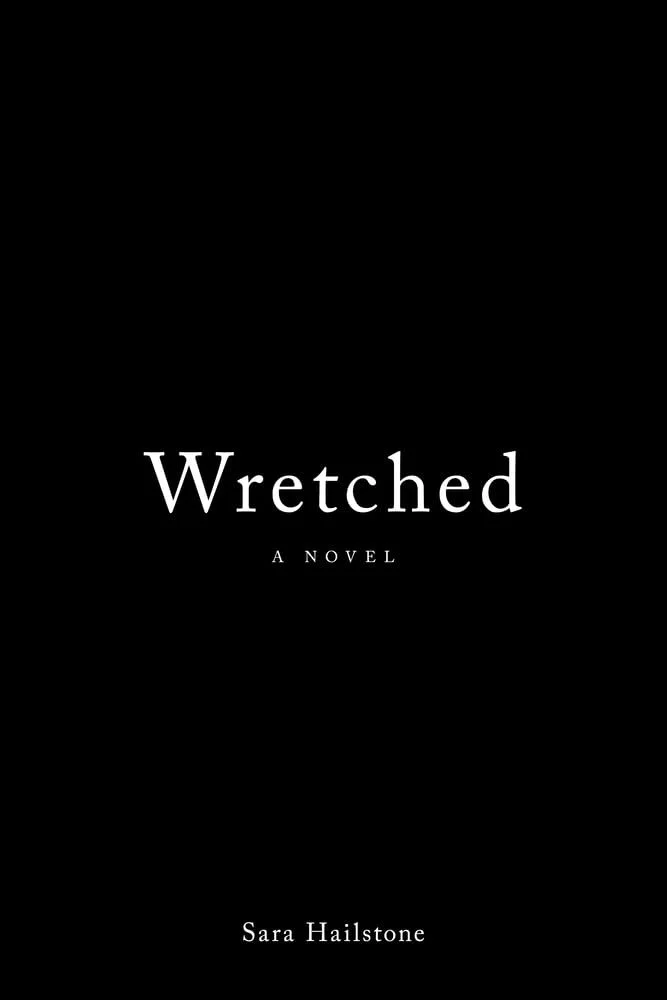Penning Inherited Pain: A Review of Sara Hailstone’s Wretched
A Review by sumaiya matin
November 18, 2025
Wretched. Sara Hailstone. Running Wild Press. $29.99, 484 pp., ISBN: 9781960018724
Intergenerational trauma often echoes in silence, and to translate it onto a blank page is a formidable challenge. Sara Hailstone does justice to this complex act of penning collective forces while mining interior worlds of her characters when crafting her multigenerational family saga, Wretched.
Wretched braids multiple timelines, geographic locations and character trajectories, from World War II Belgium to 21st century Canada. A pregnant Nelle seeks to unravel her paternal grandmother Sophie’s past while navigating pregnancy and violence (as alluded to) in her own relationship. Sophie’s timeline follows her to 1940s occupied Brussels, where she aids Jews to safety, including Eli, the lover she loses at the hands of German soldiers. She then travels to Madoc, Ontario out of survival, where she resides post-war with Phillip, an airplane mechanic during the war for Canadians. When Nelle discovers two cloth Stars of David in a basement clay canister and two letters written by a Jewish man from an internment camp, she becomes curious about her grandmother’s stoic demeanour and the little she reveals about her past life. As Sophie’s life and Nelle’s growing connection with her unborn child unravel on the page, so do the ripples of inherited pain from collective cultural injury and family history. This novel is an ambitious undertaking, executed with substantial research, nuanced realism and imagistic, visceral language.
The first few chapters are told from the perspective of an omniscient storyteller who offers guidance to a future girl child, framing and foreshadowing the emotional rippling that’s to occur as each chapter braids into the next:
The Women of this family have always thirsted for warmth and security. They’ve gravitated towards men in order to grasp at such things. Self-manifested desire has been our undoing, but it is far deeper than desire, too. You are only three generations away from all this and you must know what I know…
The Storyteller warns that “Truth will never be tangible…It is free from possession, unlike post-War men and Women,” and Hailstone proves this when she alternates perspectives between the past and the present and from Sophie to Nelle, to complicate narrative reliability (but also to strengthen its connective tissue). As a reader, I’m a witness to the characters’ individual trajectories, but also the formation and course of a third character - the trauma itself - in both its intangibility and materialization, how it gets coded and transmuted through bodies, language (or lack thereof), and behaviour.
One of Hailstone’s strengths is her ability to characterize those who experience grave emotional, spiritual and physical injuries without making them one-dimensional victims. Sophie, once Amelie, is raped after trying to get passport papers to her Jewish lover Eli, who is captured moments before in front of her very eyes. She returns to this memory when she is raped by her husband after he discovers her real name; he does not know that Sophie is a deadname, taken by Amelie to escape and survive her trauma. Betrayed and knotted in his own anger, he inflicts further pain upon her. He entitles himself to her body as if it is merely an object to possess.
Sophie is perpetually trapped in memories, and continues to endure her reality through silence and dissociation:
Her eyes found the spider’s web and stayed there, the radials that fanned across the ceiling and adjoining walls trapped her in the prism bending the light of realization and acceptance that this was her life now. A deep fissure ran behind the web extending up onto the ceiling collecting in a profusion of tangled swells and indents. She wept. She focused. Her pupils shrank to pinholes, the muscles in her thighs tightened…Phillip felt like leather, as if her gloves were pulled on and she was outside, pinned to the mud. His breath became ragged, a rhythm that flung her back into darkness, blood, and waking up underneath that tree.
Despite her vulnerability, Sophie is magnetic, both in appearance and in her mysterious demeanour. As a new immigrant to Canada – knowing little English and living as an outsider in her in-laws’ home – she learns to push out others’ narratives about her and focus on her own. This gradual emotional shielding contains her, gives her a footing when the world around her does not offer security, but rather hate and judgment:
She did not see their eyes, the curious glances and the brave belligerent stares from the Madocians. She heard only her own internal scripting, the flush of her French accent braided with this new emerging language, comprehension pressing confidence.
In these characterizations, depictions of both inferiority and assurance, Hailstone makes her characters realistic. They are multifaceted, flawed, vulnerable, rigid but elastic. Inspiring, even. As a reader, I am a witness to the tragic course of Sophie’s inward retreat:
She will sink into her green leather armchair as an elder, roll a blanket around her stiff knees, and acknowledge that she is a person not understood. Those that rotate in her presence do so out of obligation and familial duty, they wish that, somehow, they could extend themselves as bridges, or locate the spaces between the shingles of her soul. She lets so few in, and that footing is unsure, constantly changing.
The impact of war materializes through her and the residue of pain, as it touches the people around her, travels to my own fingertips turning the pages. Wretched is emotionally resonant. In fact, in its reckoning with history, it cracks the heart open and prods us to confront the injuries in our own histories - individual and collective. Reading this book at a time where there are multiple genocides, massacres and displacements occurring in the world, including that of the people in Palestine, I am prompted to ask: What do we do with rippling pain? What can we do to prevent history from repeating itself, in different forms?
The women in Wretched survive pain by tucking away their true selves in crevices (a reoccurring image throughout the novel). They learn to adapt to the orderly clockwork of society and its constructs, restraining their true voices, and in doing so, cannot reach each other, and maybe even themselves.
What’s revolutionary for the women of Wretched is to love themselves in the face of the pain that renders them wretched. Nelle loosens the grip of the past when she begins to write her narrative and craft the language of her family history for her child. Pain is a shadow that looms over every character, including the males, but Hailstone illuminates it, delicately writes beauty into it - observing, naming, speaking to it with language that tenderly holds grief. A brave cathartic unravelling that offers possibility and hope.
Wretched’s emotional resonance also lies in its imagistic, emotive language, the rich interlacing of history, including that of early colonizers and their relations with Indigenous communities, motifs such as the tree of life, and subtext that prompts readers to fill in gaps in the narrative, to piece it together. Although it may be challenging to ground oneself in the narrative at first, one thing is for certain: this story is not for passive readers, nor the faint of heart.
Sumaiya Matin wears many hats as a writer, social worker, educator and public policy professional. She holds a Master of Social Work and is currently working toward her Master of Fine Arts (in Creative Writing) at the University of British Columbia. In 2021, she released a literary memoir titled The Shaytan Bride: A Bangladeshi Canadian Memoir of Desire and Faith (Toronto: Dundurn Press, 2021). She lives in amiskwacîwâskahikan (Edmonton) but you can also find her online at @sumaiya.matin on Instagram or www.sumaiyamatin.com


